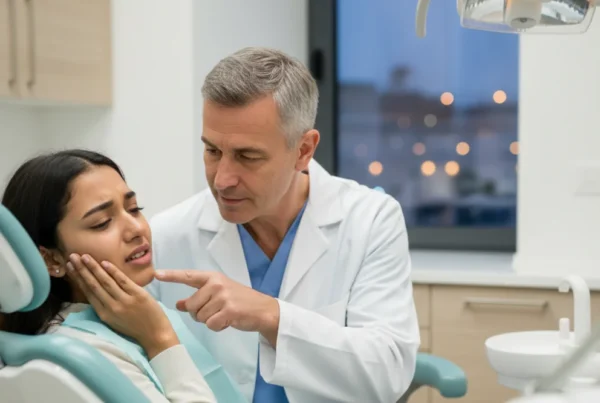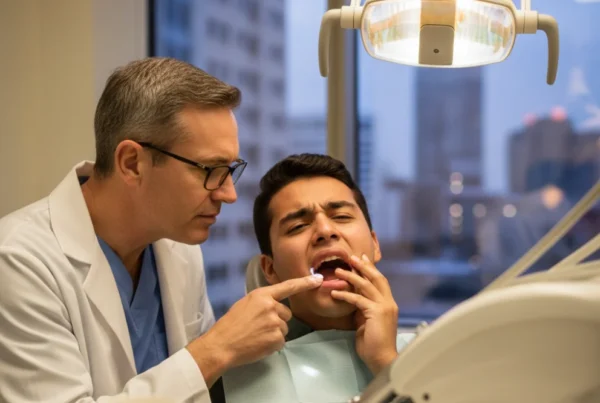When you think about dental problems, a tooth abscess might not be the first thing that comes to mind, but it should be near the top of your list of concerns. These infections are much more serious than most people realize, and they can quickly escalate from a painful inconvenience to a life threatening emergency if not treated properly.
What makes tooth abscesses particularly dangerous is that they don’t stay localized to your mouth. The bacteria causing the infection can spread through your bloodstream to other parts of your body, potentially causing sepsis, endocarditis, or other serious systemic infections that require immediate medical intervention.
Understanding what a tooth abscess is, how to recognize the symptoms, and why prompt treatment is so crucial can literally save your life. This isn’t about being dramatic or trying to scare you, it’s about making sure you have the information you need to protect your health when faced with this serious dental condition.
Why Antibiotics Alone Won’t Solve the Problem
One of the biggest misconceptions about tooth abscesses is that you can just take some antibiotics and the problem will go away. While antibiotics are often part of the treatment plan, they’re not a cure by themselves, and relying on them alone can actually make your situation much worse.
The problem with abscesses is that they create a pocket of infection in a confined space where blood circulation is limited. Antibiotics travel through your bloodstream, but they can’t effectively reach the bacteria trapped inside the abscess cavity. It’s like trying to put out a fire that’s locked inside a safe, the water can’t get to where it needs to go.
What antibiotics can do is help control the spread of infection and reduce some of the symptoms, which might make you feel better temporarily. But this improvement is often misleading because the underlying infection is still there, continuing to cause damage and potentially spreading to other areas.
Only professional dental treatment can actually drain the abscess, remove the infected tissue, and eliminate the source of the bacteria. This might involve root canal treatment, extraction, or surgical drainage, depending on the specific situation. Without this definitive treatment, the infection will likely return even after antibiotics have temporarily controlled it.
Recognizing the Tricky Nature of Abscess Symptoms
Tooth abscess symptoms can be confusing because they don’t always follow a predictable pattern. You might experience severe pain one day and feel much better the next, leading you to think the problem has resolved itself. Unfortunately, this improvement is often temporary and can be dangerously misleading.
The pain from an abscess can fluctuate for several reasons. Sometimes the pressure from the infection finds a way to drain temporarily, providing relief. Other times, your body’s immune response might temporarily gain the upper hand against the bacteria. But these improvements rarely last without proper treatment.
What’s particularly concerning is that the infection can continue to spread even when you’re not experiencing significant pain. The bacteria don’t take a break just because your symptoms have improved, and the longer you wait for treatment, the more likely you are to develop serious complications.
This is why it’s so important to seek professional evaluation as soon as you suspect you might have an abscess, even if your symptoms seem to be improving. Early treatment is not only more effective, it’s also typically less invasive and less expensive than waiting until the infection has progressed.
Advanced Treatment Approaches That Actually Work
Modern dentistry offers sophisticated approaches to treating tooth abscesses that are more effective and comfortable than ever before. Understanding these treatment options can help you feel more confident about seeking the care you need rather than trying to tough it out or rely on home remedies.
Digital imaging and advanced diagnostic tools allow dentists to see exactly what’s happening inside your tooth and surrounding tissues. This precision means that treatment can be targeted specifically to your situation rather than using a one size fits all approach that might not address your particular infection.
Randall Dentistry in Dallas, Texas uses state of the art technology to ensure that abscess treatment is as effective and comfortable as possible. Advanced techniques like laser assisted disinfection can eliminate bacteria more thoroughly than traditional methods while promoting faster healing.
Modern pain management techniques also mean that abscess treatment doesn’t have to be the painful ordeal that many people fear. Local anesthesia, sedation options, and advanced techniques can keep you comfortable throughout the procedure while ensuring that the infection is completely eliminated.
When Abscess Symptoms Become Medical Emergencies
While all tooth abscesses need prompt dental attention, certain symptoms indicate that you need immediate emergency care, potentially even before you can get to a dentist. Recognizing these warning signs can prevent serious complications or even save your life.
Difficulty swallowing or breathing along with tooth pain indicates that swelling from the infection may be affecting your airway. This is a true medical emergency that requires immediate hospital care, not just a dental appointment. Don’t wait to see if these symptoms improve on their own.
High fever accompanying dental pain suggests that the infection has spread beyond the local area and is affecting your entire body. This systemic infection can quickly become life threatening and requires immediate medical intervention with intravenous antibiotics and other treatments.
Rapid facial swelling, especially if it’s spreading down your neck, can indicate a serious infection called Ludwig’s angina that can block your airway. This condition can progress rapidly and requires emergency medical treatment to prevent life threatening complications.
Severe, uncontrollable pain that doesn’t respond to over the counter medications often indicates a serious infection that needs immediate professional intervention to prevent permanent damage or systemic complications.
The Importance of Patient Education and Early Recognition
Understanding how to recognize the early signs of a tooth abscess can make the difference between simple treatment and a medical emergency. The more you know about what to look for, the better equipped you’ll be to seek appropriate care before complications develop.
Early abscess symptoms might include persistent tooth pain, especially when biting down or applying pressure to the tooth. You might also notice sensitivity to hot and cold temperatures that doesn’t go away, or a bad taste in your mouth that persists despite good oral hygiene.
Swelling in your gums, face, or jaw is another important warning sign that shouldn’t be ignored. This swelling might start small and gradually increase, or it might develop rapidly depending on the nature of the infection.
Changes in how your tooth feels when you bite down, or a feeling like the tooth is sitting higher than your other teeth, can indicate that infection and swelling are affecting the tooth’s position. These subtle changes are often early signs that professional evaluation is needed.
Randall Dentistry emphasizes patient education because informed patients are more likely to recognize problems early and seek appropriate care before complications develop. This proactive approach leads to better outcomes and less invasive treatments.
Comprehensive Prevention Strategies
While not all abscesses can be prevented, there are specific strategies you can implement to significantly reduce your risk of developing these serious infections. Prevention is always preferable to treatment, both for your comfort and your overall health.
Excellent daily oral hygiene is your first line of defense against the bacteria that cause abscesses. This means thorough brushing and flossing that removes plaque from all surfaces of your teeth, including areas where your toothbrush might not reach easily.
Regular dental checkups and cleanings allow for early detection and treatment of problems before they progress to the point of causing abscesses. Small cavities can be filled before they reach the tooth’s nerve, and gum disease can be treated before it leads to serious infections.
Managing underlying health conditions that increase your risk of dental infections is also important. Diabetes, for example, can make you more susceptible to dental infections, so keeping your blood sugar well controlled helps protect your oral health as well as your overall health.

Individual Risk Factors and Personalized Prevention
Some people have higher risk factors for developing tooth abscesses, and understanding your personal risk profile helps you take appropriate preventive measures. These risk factors aren’t necessarily under your control, but being aware of them helps you stay vigilant.
Previous dental work, especially if it’s older or has had problems, can increase your risk of developing abscesses. Crowns, fillings, and other restorations can develop problems over time that allow bacteria to reach the tooth’s inner structures.
Lifestyle factors like smoking significantly increase your risk of dental infections because tobacco use impairs your immune system’s ability to fight off bacteria. If you smoke, quitting is one of the most important things you can do for your oral health.
Certain medications can also affect your oral health and infection risk. Some medications reduce saliva production, which removes one of your mouth’s natural defenses against bacteria. Others might suppress your immune system, making infections more likely to develop and progress.
Genetic factors can influence your susceptibility to dental problems, including abscesses. If you have a family history of dental problems, you might need to be more vigilant about prevention and more proactive about seeking care when problems arise.
Advanced Prevention and Risk Reduction Strategies
For people at higher risk of developing dental abscesses, additional preventive measures can provide extra protection against these serious infections. These strategies go beyond basic oral hygiene to address specific risk factors and vulnerabilities.
Specialized preventive treatments can provide additional protection for high risk patients:
- Prescription fluoride products: Stronger formulations that help strengthen tooth enamel and resist bacterial acid attacks
- Antimicrobial rinses: Professional strength mouthwashes that reduce harmful bacteria in the mouth
- More frequent professional cleanings: Customized schedules based on individual risk factors and oral health status
- Protective dental appliances: Night guards for people who grind their teeth or sports guards for active individuals
- Nutritional counseling: Guidance on dietary choices that support oral health and reduce infection risk
These advanced prevention strategies are tailored to individual needs and risk factors, providing personalized protection against dental abscesses and other serious oral health problems.
Emergency Preparedness and Action Plans
Even with excellent prevention, dental emergencies can occur, and having a plan for how to respond can make a significant difference in outcomes. Knowing what to do and who to call can prevent minor problems from becoming major complications.
Emergency contact information should be easily accessible, including your regular dentist’s after hours number and information about local emergency dental services. Don’t wait until you need it to figure out who to call or where to go.
First aid for dental emergencies varies depending on the situation, but some general principles apply. For severe pain, over the counter medications can provide temporary relief while you seek professional care. For swelling, cold compresses can help reduce inflammation.
When to go to the emergency room versus when to call your dentist depends on the severity and type of symptoms you’re experiencing. Breathing difficulties, severe facial swelling, or high fever require immediate medical attention, while severe tooth pain might be managed with emergency dental care.
Long Term Oral Health After Abscess Treatment
Successfully treating a tooth abscess is just the beginning of maintaining good oral health. Understanding how to prevent recurrence and maintain the health of treated teeth helps ensure that you don’t face similar problems in the future.
Follow up care after abscess treatment is crucial for ensuring that the infection has been completely eliminated and that healing is progressing normally. This might involve additional appointments to monitor the treated area and make sure no complications develop.
Ongoing prevention strategies become even more important after you’ve had an abscess because having one infection can increase your risk of developing others. This makes excellent oral hygiene and regular professional care essential for long term oral health.
Lifestyle modifications that reduce your risk of future infections might include changes in diet, oral hygiene habits, or management of underlying health conditions that contributed to the original abscess.
Your Health and Safety Come First
Tooth abscesses are serious medical conditions that require prompt professional treatment. While they can be frightening, understanding what they are and how they’re treated can help you respond appropriately and avoid serious complications.
The key to successful abscess treatment is recognizing symptoms early and seeking professional care promptly. Delaying treatment or trying to manage the infection on your own with antibiotics or home remedies can lead to serious complications that are much more difficult and expensive to treat.
Randall Dentistry in Dallas, Texas is committed to providing prompt, effective treatment for tooth abscesses using the latest technology and techniques to ensure the best possible outcomes for patients. Ready to protect yourself from the serious complications of tooth abscesses?
Contact us today to learn how our comprehensive approach to emergency dental care can provide the immediate treatment you need while helping you prevent future infections and maintain optimal oral health for life.
Frequently Asked Questions
What are the warning signs of a tooth abscess that I should never ignore?
Key warning signs include severe, persistent tooth pain, swelling in your face or gums, fever, difficulty swallowing or breathing, and a bad taste in your mouth that won’t go away. Any combination of these symptoms, especially fever or breathing difficulties, requires immediate professional attention as the infection can spread to other parts of your body and become life threatening.
Can I treat a tooth abscess with just antibiotics instead of seeing a dentist?
No, antibiotics alone cannot cure a tooth abscess. While they may temporarily reduce symptoms and help control the spread of infection, they cannot eliminate the source of the bacteria or properly drain the abscess. Professional dental treatment is essential to completely resolve the infection and prevent it from returning or causing serious complications.
How can I prevent tooth abscesses from developing in the first place?
Prevention focuses on excellent daily oral hygiene including thorough brushing and flossing, regular dental checkups and cleanings, and managing risk factors like diabetes or smoking. Prompt treatment of dental problems like cavities or gum disease before they progress is also crucial, as is avoiding habits that can damage teeth and create entry points for bacteria.
Schedule your appointment today!
Randall Dentistry
214-750-4901
6805 Hillcrest Avenue, Suite 218
Dallas, TX 75205





